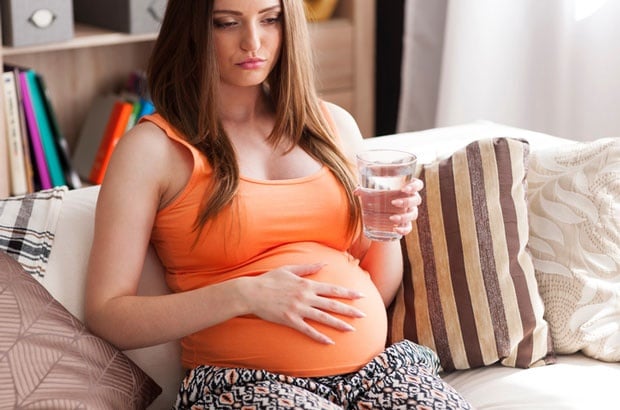
Midwife Tina Otte explains why constipation happens, and what can you do about it...
Your body produces more female hormones than usual while you’re pregnant.
These hormones have the important job of ensuring that your pregnancy develops as it should, but their presence does cause some unwelcome side effects.
One of them is increased constipation.
Constipation during pregnancy occurs for four main reasons:
- Slow digestion
- Pressure on the intestines
- Influence of hormones
- Lack of moisture
The high levels of progesterone relax the smooth muscle walls of the bowel, slowing down the entire digestive tract. As if this wasn’t enough, the increasing pressure of the growing uterus on the intestines causes them to be pushed into an even smaller space.
This means that it becomes even more difficult for the waste to move through the mass of pulsing muscular tubing.
The longer waste stays in the bowel, the more moisture is absorbed, so the waste gets harder and even more difficult to expel. Nature slows down your digestive tract for a very good reason.
Food stays in the stomach longer so that the placenta has more time to absorb the necessary nutrients to pass to your baby. This means that it takes longer for your body to expel its waste.
Also read: Find all our pregnancy information in one place
Other causes include irregular eating habits, stress, some medications, including iron remedies, lack of fibre and exercise, or too little intake of fluids.
What are the signs of constipation?
- More than four days between bowel movements
- Dry, hard stools that are painful and difficult to pass
- If you’re left with a feeling that not everything has passed when you do have a bowel movement.
- If there’s bleeding from the rectal area when hard stools have been passed.
- Lack of appetite and not being able to face food
- Bloating of the lower abdomen, cramp, spasm and pain
- Having a headache and general unease are signs of constipation and dehydration.
You’re at increased risk to suffer from constipation in pregnancy if:
- You’re already prone to bouts of constipation.
- You have nausea and vomiting and aren’t managing to eat as much as you should be.
- You have irritable bowel syndrome (IBS).
- Pregnancy-induced anaemia may make constipation worse, as well as some of the medications used to treat anaemia
- You don’t exercise.
Lack of exercise makes your whole system sluggish. As your pregnancy progresses, increased pressure on your pelvic area makes constipation more likely.
While you do not influence your hormones or the decreasing space in your abdomen, there’s a lot you can do to prevent constipation from happening, and ways to manage it if it’s a problem.
Also read: Can’t touch this? Foods to avoid when you're pregnant
Prevention is better than cure
Constipation isn’t life-threatening, but it can become uncomfortable and can make haemorrhoids/piles much worse. Tackle constipation before it becomes a problem.
Stay active! Brisk walking several times a week will wake up your system.
Other forms of exercise, like swimming and yoga, are also a good idea.
Drink at least eight cups of water a day
Sip it throughout the day, and you’ll not find yourself in the loo as much as if you drink a glass quickly every hour or so.
Limit your intake of tea and other caffeinated products such as coffee and colas. These can irritate your bladder and make you want to urinate more often.
It would help if you had roughage to assist with digestion
Add high fibre foods to your diet. Eat raw or cooked fruits and vegetables and whole-grain products, like wholewheat bread, brown rice and oatmeal. Sprinkle your salads, fruit, vegetables and breakfast cereals with crushed linseeds and prunes.
Chew your food well. Try to take your iron supplements with orange juice or prune juice. Follow good bowel habits. Respond immediately to your body’s cues.
When to worry When you’re experiencing repeated rectal bleeding or abdominal pain, and nothing seems to help, notify your doctor immediately as there may be something more serious going on, such as intestinal inflammation or parasites.
Chatback:
Share your stories and questions with us via email at chatback @ parent24.com. Anonymous contributions are welcome.
Don't miss a story!
For a weekly wrap of our latest parenting news and advice, sign up to our Friday Parent24 newsletter.




 Publications
Publications
 Partners
Partners














